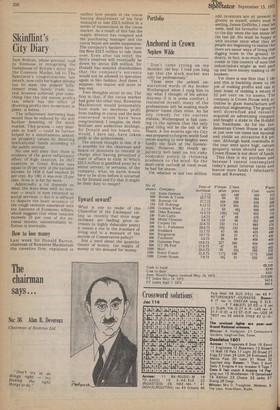Skinflint's City Diary
Sam Brittan, whose personal road to Emmaus in recognising the foolishness of Britain's entry into the Common Market led to The Spectator's congratulations last month, now calls for higher Me.orne tax to meet the present inflationary crisis. Surely Credit control, however achieved, plus something like the old excess profits tax, which has the effect of diverting profits into investment in plant, is better.
The inflationary borrowing base would thus be reduced by the still further lowering of the stock market. This process — very desirable in itself — could be further helped by a simultaneous assault on property values by directing institutional funds according to the public interest.
No one will deny that there is evidence of the grave inflationary effect of high taxation. In 1913 taxation in Great Britain was equal to 10 per cent of the national income. In 1938 it had reached 20 per cent. By 1961 it was over 25 per cent. Now it is far far more.
Admittedly a lot depends on what the state does with its revenue — much is now returned as social services — but it is difficult to dispute the basic accuracy of the rough reckoner associated with the Institute of Economic Affairs, which suggests that when taxation exceeds 25 per cent of the national income, uncontrollable inflation is inevitable.
How to lose money
Last week Sir Donald Barron, chairman of Rowntree Mackintosh the sweeties firm, explained in outline how people in the cocoa buying department of his firm managed to lose E32.5 million in a series of transactions in the cocoa market. As a result of this loss the supply director has resigned and the purchasing manager and the cocoa buyer are under suspension. The company's bankers have lent the firm £32.5 million to tide them over. Even after tax relief, the firm's reserves will eventually be down by about E20 million. Sir Donald has assured shareholders that the company's servants would not be allowed to speculate again in like fashion. And there, 1 suppose, the matter will more or less rest.
Two thoughts occur to me. The first is that, if the cocoa market had gone the other way, Rowntree Mackintosh would presumably have made an enormous profit from trading in cocoa and the men concerned would have been congratulated, I imagine, on their brilliant and audacious dealings. Sir Donald and his board, too, would, I dare say, have taken pride in the achievement.
The second thought is this: if it is possible for the chairman and board of directors to remain in charge after having permitted a state of affairs to exist in which 02,5 million is gambled away by a senior servant, or servants, of the company, what on earth would have to be done before it occurred to Sir Donald and Co that it might be their duty to resign?
Upward onward?
What is one to make of the Chancellor of the Exchequer telling us recently that since wage increases are leading price increases (a highly debatable point) it means a rise in the standard of living and is a measure of the success of Conservative policy?
Not a word about the quantity theory of money, the supply of money or the demand for money.
































 Previous page
Previous page